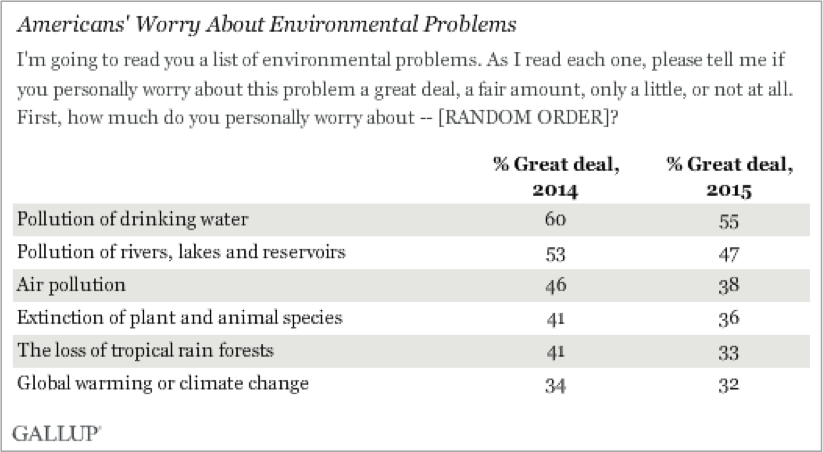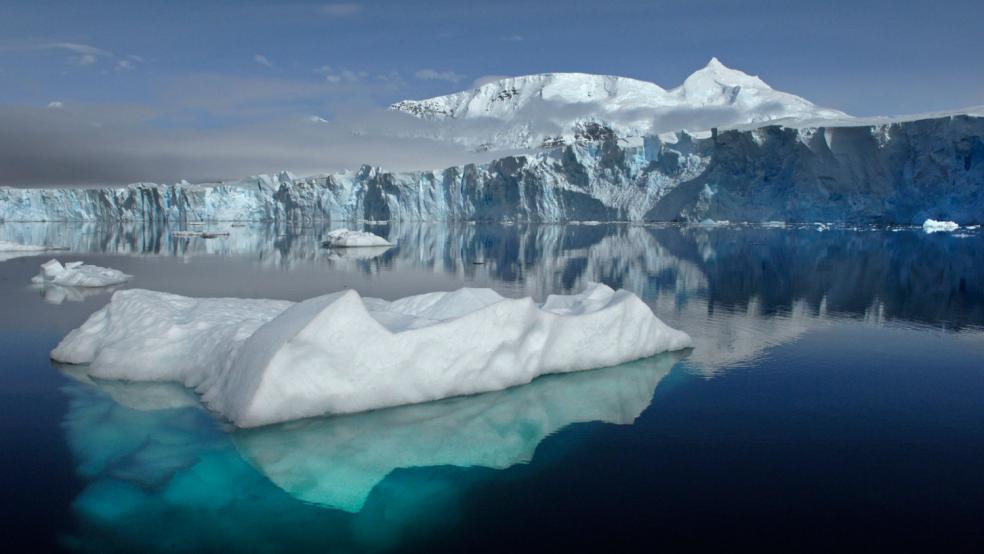Despite mounting scientific and anecdotal evidence that global warming is contributing to drought, mega-storms, flooding and coastal erosion, Americans appear less worried about that than pollution of their drinking water and lakes, air pollution and even the disappearance of tropical rain forests, according to a new Gallup survey.
Gallup’s latest annual Environment Survey conducted March 5-8, shows just 32 percent of those surveyed say global warming is a problem they worry about a great deal, compared to 55 percent who say they are fretting most about the quality of their drinking water and 38 percent who worry most about the quality of the air they breathe.
Related: How Climate Change Costs Could Soar to the Billions

During his State of the Union address in January, President Obama declared global warming the most profound danger to the future of the country. “No challenge—no challenge – poses a greater threat to future generations than climate change,” he said, noting that 2014 was the planet’s warmest year on record.
Related: Global Warming Skeptics Give Obama the Cold Shoulder
And just this week, China’s top meteorologist, Zheng Guogang, told Xinhua news service that global warming is a serious threat to the country that could have a number of adverse consequences.
Zheng warned of more droughts, rainstorms, and higher temperatures, which he said would threaten river flows and harvests, as well as major infrastructure projects such as the Three Gorges Dam. He urged China to pursue a lower-carbon future, according to media reports. It was a rare admission from a prominent official in a country that ranks as the world’s top emitter of carbon emissions – a leading contributor to climate change – with the United States ranking second.
So why are Americans more concerned about the quality of their drinking water or the fate of some wildlife species than the potential for more cataclysmic storms, floods and coastal destruction and havoc?
Related: GOP Leaders Fume over Obama’s Climate Deal with China
The most likely explanation, according to Gallup, has to do with the immediacy of the threat. That is, Americans voice less concern about long-term threats that may have far graver implications for the environment and their lives. Low-quality drinking water and polluted rivers and lakes, as well as every-day air pollution, impact the lives and health of average Americans than more distant and long-term threats, such as global warming.
Only when a region is struck by a natural catastrophe -- such as a hurricane or super storm along the eastern or southern coasts or an epic drought in California – do Americans begin connecting the dots between global warming and direct threats to their lives and businesses, although these climate events have occurred naturally long before carbon polluted the planet.
The difference today is that carbon pollution has accelerated and intensified these climate events to an unsustainable level, threatening lives and economies.
This has been the case for decades. Despite some variation in the percentage worried about various issues, the rank order of the environmental problems has remained fairly consistent over the decades, according to Gallup.
Related: Obama’s Budget Boosts EPA to Fight Climate Change
Yet the state of the economy also is an important factor in Americans’ concern about the environment.
“The amount Americans worry about the various threats tends to rise and recede in unison, with concern higher in the late 1980s and early 1990s during the revival of environmentalism, and in the late 1990s and early 2000s amid the economic boom,” Gallup said in an analysis. “Since then, Americans' worry has fallen, with concern dipping to record lows on most issues in 2010 or 2011. The current level of worry on each issue remains at or near those record lows.”
In effect, Americans tend to attach a higher priority to environmental concerns when the economy is healthy than when it is struggling. In recent decades, the U.S. economy has arguably been its strongest in late 1999 and early 2000 – the very times when environmentalism was on the rise.
Top Reads from The Fiscal Times:





